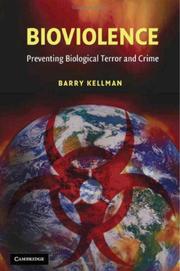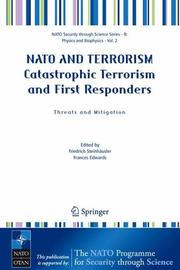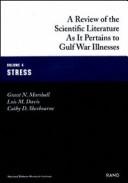| Listing 1 - 9 of 9 |
Sort by
|
Book
ISBN: 9783838343822 Year: 2011 Publisher: Saarbrucken : LAP Lambert Academic Publishing,
Abstract | Keywords | Export | Availability | Bookmark
 Loading...
Loading...Choose an application
- Reference Manager
- EndNote
- RefWorks (Direct export to RefWorks)
Book
ISBN: 9781421440750 9781421440736 9781421440743 Year: 2020 Publisher: Baltimore, Md. : Johns Hopkins University press,
Abstract | Keywords | Export | Availability | Bookmark
 Loading...
Loading...Choose an application
- Reference Manager
- EndNote
- RefWorks (Direct export to RefWorks)
"The COVID-19 pandemic has hit at a time when the future and legitimacy of the institutions, principles, and practices of the international system are already under grave stress. This moment of crisis and uncertainty demands an act of imagination and provides an opportunity to boldly reimagine our future. The contributors to this interdisciplinary edited collection ponder what the consequences of the pandemic will be for the future world order and what steps we can take to secure more peace and prosperity for the nation and the world"--
COVID-19 (Disease) --- Public health --- Medical policy. --- Medical ethics. --- Globalization. --- Climatic changes. --- Pandemics --- Political aspects. --- Economic aspects. --- Environmental aspects. --- prevention & control. --- United States --- Foreign relations --- COVID-19 (DISEASE) --- PUBLIC HEALTH--POLITICAL ASPECTS --- PUBLIC HEALTH--ECONOMIC ASPECTS --- GLOBALIZATION --- INTERNATIONAL RELATIONS

ISBN: 9780521883252 0521883253 9780521709699 0521709695 9780511510625 9780511342691 0511342691 1107185815 1281085278 9786611085278 1139133519 0511342160 0511341636 0511341059 0511510624 Year: 2007 Publisher: Cambridge : Cambridge University Press,
Abstract | Keywords | Export | Availability | Bookmark
 Loading...
Loading...Choose an application
- Reference Manager
- EndNote
- RefWorks (Direct export to RefWorks)
Bioviolence is the hostile infliction of disease: our most fundamental terror. Traitors to humanity could inflict vast tolls making everyone potentially vulnerable. Bioviolence is the most realistic way for humanity's traitors to raze the pillars of modern civilization. Too little is being done to prevent bioviolence. While bio-offenders are becoming more focused and organized, prevention policies are vague, gap-ridden, and unsupervised. No other threat presents such severe danger yet such a failure of leadership to reduce risks. The strategy for preventing bioviolence requires a broad international commitment to promote bioscience while understanding its inherent and unavoidable dangers. Bioviolence threats shrink our planet into an interdependent neighborhood. This book explores how global governance should evolve to address challenges of advancing science and technology.
Bioterrorism --- Bioterrorism. --- Biomedical Research. --- International Cooperation. --- Public Health. --- Public Policy. --- Prevention. --- prevention & control. --- legislation & jurisprudence. --- Public Policy.Prevention. --- Public health. --- Public policy. --- Bio-terrorism --- Biological terrorism --- Terrorism --- Law and legislation --- Social Sciences --- Political Science

ISBN: 9781402035838 1402035837 1402035845 9786610624331 1280624337 1402035853 Year: 2005 Publisher: Dordrecht, Netherlands : Springer,
Abstract | Keywords | Export | Availability | Bookmark
 Loading...
Loading...Choose an application
- Reference Manager
- EndNote
- RefWorks (Direct export to RefWorks)
September 11, 2001 in the U.S., March 11, 2004 in Madrid – just two examples of a series of major terror attacks against NATO member states on both sides of the Atlantic. We now know that international terrorism is capable of transboundary planning and military style execution of attacks, resulting in several thousand dead and wounded. In the future even larger terror attacks can no longer be ruled out, including the deployment of weapons of mass destruction. This new form of catastrophic terrorism poses a major challenge to the first responder community in their search and rescue operations, since these new threats represent an unprecedented risk for their health, possibly even questioning their own survival. Since the first responders are the first line of defence of every community in the aftermath of such a terror attack, it is essential for every community to ensure that its first responders are able to provide their valuable services even in such extreme situations. In this important new book a group of experts represents the current knowledge on the various terrorism threats to first responders resulting from the novel use of conventional weapons, as well radiological, nuclear, biological and chemical weapons. Also, the current situation in selected countries of different sizes and practical experience with terrorism countermeasures (Austria, Israel, Slovenia, Russia, U.S.) is reviewed, focusing on the national operational logistics and the individual needs for improving the present situation. Finally, this book offers innovative solutions to strengthen the level of protection of the first responders, culminating in fifty-one practically applicable recommendations.
Terrorism --- Terrorisme --- Congresses. --- Congrès --- EMERGENCY MANAGEMENT --- CIVIL DEFENSE --- DISASTER RELIEF --- TERRORISM --- Terrorism. --- Safety Management --- Emergency Medical Services --- Disaster Planning --- Environmental Exposure --- Environmental Pollution --- Safety --- Risk Management --- Health Services --- Violence --- Organization and Administration --- Disasters --- Health Care Facilities, Manpower, and Services --- Health Services Administration --- Crime --- Environment --- Public Health --- Accident Prevention --- Social Problems --- Environment and Public Health --- Accidents --- Health Care --- Sociology --- Criminology --- Social Sciences --- Anthropology, Education, Sociology and Social Phenomena --- Social Sciences - General --- Criminology, Penology & Juvenile Delinquency --- Social Welfare & Social Work --- North Atlantic Treaty Organization. --- North Atlantic treaty organisation --- North Atlantic Treaty Organization --- Social sciences. --- Chemistry. --- Medicine. --- Life sciences. --- Physics. --- Social Sciences. --- Social Sciences, general. --- Physics, general. --- Chemistry/Food Science, general. --- Medicine/Public Health, general. --- Life Sciences, general. --- Natural philosophy --- Philosophy, Natural --- Physical sciences --- Dynamics --- Biosciences --- Sciences, Life --- Science --- Clinical sciences --- Medical profession --- Human biology --- Life sciences --- Medical sciences --- Pathology --- Physicians --- Behavioral sciences --- Human sciences --- Sciences, Social --- Social science --- Social studies --- Civilization --- NAVO --- OTAN --- Health Workforce
Book
ISBN: 9780197549704 0197549721 0197549705 019754973X Year: 2021 Publisher: New York : Oxford University Press,
Abstract | Keywords | Export | Availability | Bookmark
 Loading...
Loading...Choose an application
- Reference Manager
- EndNote
- RefWorks (Direct export to RefWorks)
This book draws on the troubled and uneven COVID-19 experience to illustrate the critical need to ramp up resilience rapidly and effectively on a global scale. After years of working alongside public health and resilience experts crafting policy to build both pandemic and climate change preparedness, the author exposes parallels between the underutilized measures that governments should have taken to contain the spread of COVID-19 - such as early action, cross-border planning, and bolstering emergency preparation - and the steps leaders can take now to mitigate the impacts of climate change. Through practical analyses of current policy and thoughtful guidance for successful climate adaptation, this book reveals that, just as our society has transformed itself to meet the challenge of coronavirus, so too will we need to adapt our thinking and our policies to combat the ever-increasing threat of climate change.
CLIMATIC CHANGES--GOVERNMENT POLICY --- CLIMATE CHANGE MITIGATION --- COVID-19 PANDEMIC, 2020 --- -EMERGENCY MANAGEMENT--GOVERNMENT POLICY --- Climatic changes - Government policy --- Climate change mitigation --- COVID-19 (Disease) - Government policy --- Medical policy --- Emergency management - Government policy --- Emergency management --- Climatic changes --- COVID-19 (Disease) --- Medical policy. --- Climate change mitigation. --- Government policy. --- Climate mitigation --- Climatic mitigation --- Mitigation of climate change --- Environmental protection --- Health care policy --- Health policy --- Medical care --- Medicine and state --- Policy, Medical --- Public health --- Public health policy --- State and medicine --- Science and state --- Social policy --- 2019-nCoV disease --- 2019 novel coronavirus disease --- Coronavirus disease-19 --- Coronavirus disease 2019 --- COVID-19 virus disease --- COVID19 (Disease) --- Novel coronavirus disease, 2019 --- SARS coronavirus 2 disease --- SARS-CoV-2 disease --- Coronavirus infections --- Respiratory infections --- Consequence management (Emergency management) --- Disaster planning --- Disaster preparedness --- Disaster prevention --- Disaster relief --- Disasters --- Emergencies --- Emergency planning --- Emergency preparedness --- Management --- Public safety --- First responders --- Mitigation --- Government policy --- Planning --- Preparedness --- Prevention
Book
ISBN: 9781509546466 9781509546459 1509546464 1509546456 Year: 2020 Publisher: Cambridge, UK : Polity press
Abstract | Keywords | Export | Availability | Bookmark
 Loading...
Loading...Choose an application
- Reference Manager
- EndNote
- RefWorks (Direct export to RefWorks)
The global response to the Covid-19 pandemic is the greatest science policy failure in a generation. We knew this was coming. Warnings about the threat of a new pandemic have been made repeatedly since the 1980s and it was clear in January that a dangerous new virus was causing a devastating human tragedy in China.' And yet the world ignored the warnings. Why' In this short and hard-hitting book, Richard Horton, editor of the medical journal The Lancet, scrutinizes the actions that governments around the world took ' and failed to take ' as the virus spread from its origins in Wuhan to the global pandemic that it is today. He shows that many Western governments and their scientific advisors made assumptions about the virus and its lethality that turned out to be mistaken. Valuable time was lost while the virus spread unchecked, leaving health systems unprepared for the avalanche of infections that followed. Drawing on his own scientific and medical expertise, Horton outlines the measures that need to be put in place, at both national and international levels, to prevent this kind of catastrophe from happening again.'We're supposed to be living in an era where human beings have become the dominant influence on the environment, but Covid-19 has revealed the fragility of our societies and the speed with which our systems can come crashing down. We need to learn the lessons of this pandemic and we need to learn them fast because the next pandemic may arrive sooner than we think.
COVID-19 (Disease) --- Epidemics --- Prevention --- Social aspects --- Government policy --- Pandemics --- Coronavirus Infections --- Disease Transmission, Infectious --- Public health --- Covid-19 --- Santé publique --- Épidémies --- Maladies infectieuses --- prevention & control --- epidemiology --- history --- Political aspects. --- Social aspects. --- history. --- Government policy. --- Aspect politique. --- Aspect social. --- Histoire. --- Prévention. --- Epidémiologie. --- COVID-19 (DISEASE)--PREVENTION --- COVID-19 (DISEASE)--SOCIAL ASPECTS --- EPIDEMICS--PREVENTION --- 241 Hedendaagse wereldproblemen --- 670 Gezondheid --- COVID-19 --- Pandemie --- gezondheid --- Bee Collection --- COVID-19 (Disease) - Prevention --- COVID-19 (Disease) - Social aspects --- Epidemics - Government policy --- prevention & control.
Book
ISBN: 9780520307735 9780520307728 0520973828 0520307720 0520307739 9780520973824 Year: 2022 Publisher: Berkeley : University of California Press,
Abstract | Keywords | Export | Availability | Bookmark
 Loading...
Loading...Choose an application
- Reference Manager
- EndNote
- RefWorks (Direct export to RefWorks)
What our health data tell American capitalism about our value--and how that controls our lives. Afterlives of Data follows the curious and multiple lives that our data live once they escape our control. Mary F. E. Ebeling's ethnographic investigation shows how information about our health and the debt that we carry becomes biopolitical assets owned by healthcare providers, insurers, commercial data brokers, credit reporting companies, and platforms. By delving into the oceans of data built from everyday medical and debt traumas, Ebeling reveals how data about our lives come to affect our bodies and our life chances and to wholly define us. Investigations into secretive data collection and breaches of privacy by the likes of Cambridge Analytica have piqued concerns among many Americans about exactly what is being done with their data. From credit bureaus and consumer data brokers like Equifax and Experian to the secretive military contractor Palantir, this massive industry has little regulatory oversight for health data and works to actively obscure how it profits from our data. In this book, Ebeling traces the health data--medical information extracted from patients' bodies--that are digitized and repackaged into new data commodities that have afterlives in database lakes and oceans, algorithms, and statistical models used to score patients on their creditworthiness and riskiness. Critical and disturbing, Afterlives of Data examines how Americans' data about their health and their debt are used in the service of marketing and capitalist surveillance.
Medical records --- Debt --- Human rights --- Information systems --- Clinical records --- Health records --- Hospital medical records --- Patient care records --- Communication in medicine --- Hospital records --- Indebtedness --- Finance --- Political aspects --- Access control --- Economic aspects --- CONSUMER PROFILING--DATA PROCESSING --- DEBTS, EXTERNAL--USA --- PUBLIC HEALTH--ECONOMIC ASPECTS --- INFORMATION TECHNOLOGY--ECONOMIC ASPECTS --- DATA PROTECTION --- DATA MINING--MORAL AND ETHICAL ASPECTS --- Political aspects. --- HIPAA. --- algorithms. --- biometrics. --- credit information. --- data economy. --- data privacy. --- databases. --- electronic health record. --- finance. --- health informatics. --- medical systems. --- social determinants of health.

ISBN: 0585344930 9780585344935 083302681X 9780833026811 083302681X Year: 1999 Publisher: Santa Monica, CA : <1998-©2001> Rand,
Abstract | Keywords | Export | Availability | Bookmark
 Loading...
Loading...Choose an application
- Reference Manager
- EndNote
- RefWorks (Direct export to RefWorks)
Uranium --- Radiation Effects --- Persian Gulf Syndrome --- Metals, Heavy --- Occupational Diseases --- Radiation --- Actinoid Series Elements --- Radiologic Health --- Metals --- Diseases --- Elements --- Electromagnetic Phenomena --- Public Health --- Elements, Radioactive --- Inorganic Chemicals --- Physical Phenomena --- Environment and Public Health --- Phenomena and Processes --- Chemicals and Drugs --- Health Care --- Pathology --- Medicine --- Health & Biological Sciences --- Community-Based Distribution --- Contraceptive Distribution --- Delivery of Healthcare --- Dental Care Delivery --- Distribution, Non-Clinical --- Distribution, Nonclinical --- Distributional Activities --- Healthcare --- Healthcare Delivery --- Healthcare Systems --- Non-Clinical Distribution --- Nonclinical Distribution --- Delivery of Dental Care --- Health Care Delivery --- Health Care Systems --- Activities, Distributional --- Activity, Distributional --- Care, Health --- Community Based Distribution --- Community-Based Distributions --- Contraceptive Distributions --- Deliveries, Healthcare --- Delivery, Dental Care --- Delivery, Health Care --- Delivery, Healthcare --- Distribution, Community-Based --- Distribution, Contraceptive --- Distribution, Non Clinical --- Distributional Activity --- Distributions, Community-Based --- Distributions, Contraceptive --- Distributions, Non-Clinical --- Distributions, Nonclinical --- Health Care System --- Healthcare Deliveries --- Healthcare System --- Non Clinical Distribution --- Non-Clinical Distributions --- Nonclinical Distributions --- System, Health Care --- System, Healthcare --- Systems, Health Care --- Systems, Healthcare --- Physical Phenomenon --- Physical Process --- Physical Concepts --- Physical Processes --- Concept, Physical --- Concepts, Physical --- Phenomena, Physical --- Phenomenon, Physical --- Physical Concept --- Process, Physical --- Processes, Physical --- Chemicals, Inorganic --- Radioactive Elements --- Environment, Preventive Medicine & Public Health --- Environment, Preventive Medicine and Public Health --- Health, Public --- Electrical Phenomena --- Electrical Phenomenon --- Electromagnetic Phenomenon --- Electromagnetics --- Electrical Concepts --- Electromagnetic Concepts --- Concept, Electrical --- Concept, Electromagnetic --- Concepts, Electrical --- Concepts, Electromagnetic --- Electrical Concept --- Electromagnetic Concept --- Electromagnetic Phenomenas --- Phenomena, Electrical --- Phenomena, Electromagnetic --- Phenomenon, Electrical --- Phenomenon, Electromagnetic --- Health, Radiologic --- Radiological Health --- Health, Radiological --- Radiations --- Diseases, Occupational --- Occupational Illnesses --- Disease, Occupational --- Illnesse, Occupational --- Illnesses, Occupational --- Occupational Disease --- Occupational Illnesse --- Heavy Metals --- Gulf War Syndrome --- Syndrome, Gulf War --- Syndrome, Persian Gulf --- Effects, Radiation --- Effect, Radiation --- Radiation Effect --- Metals, Actinide --- Actinides --- Actinoids --- Metals, Actinoid --- Actinide Metals --- Actinoid Metals --- Elements, Actinoid Series --- Radioisotopes --- Community Health --- Health, Community --- Preventive Medicine --- Education, Public Health Professional --- Dose Hypofractionation --- Accidents, Occupational --- Industry --- Occupational Medicine --- Karoshi Death --- Heavy Metal Poisoning --- Environmental Exposure --- Multiple Chemical Sensitivity --- Radiation Genetics --- Radiation Tolerance --- Radiation Dose Hypofractionation --- Element --- Metal --- Heavy Metal --- Metal, Heavy --- Heavy metals. --- Toxic metals --- Poisons --- Gulf War syndrome --- Persian Gulf War syndrome --- Persian Gulf War, 1991 --- Syndromes --- Health aspects
Book
ISBN: 9780745690797 0745690793 9780745690803 0745690807 Year: 2015 Publisher: Cambridge, UK Malden, MA Polity Press
Abstract | Keywords | Export | Availability | Bookmark
 Loading...
Loading...Choose an application
- Reference Manager
- EndNote
- RefWorks (Direct export to RefWorks)
Today, we are far less likely to die from infection than at any other time in history, but still we worry about epidemics, the menace of antibiotic resistance and modern 'plagues' like Ebola. In this timely new book, eminent bacteriologist Hugh Pennington explores why these fears remain and why they are unfounded. He reports on outright victories (such as smallpox), battles where the enemy is on its last stand (polio), surprise attacks from vegetarian bats (Ebola, SARS) and demented cows (BSE). Qualified optimism, he argues, is the message for the future but the battles will go on forever. -- Provided by publisher.
Bacteria. --- Viruses. --- Communicable diseases --- World health. --- Epidemics --- 616.98 --- bacteriën --- virussen --- Infectieziekten --- #SBIB:316.334.2A15 --- #SBIB:316.334.2A500 --- Global health --- International health --- Public health --- Medical geography --- Contagion and contagious diseases --- Contagious diseases --- Infectious diseases --- Microbial diseases in human beings --- Zymotic diseases --- Diseases --- Infection --- Medical microbiology --- Quarantine --- Biosecurity --- Genetic vectors --- Microorganisms --- Mobile genetic elements --- Extrachromosomal DNA --- Germs --- Microbes --- Prokaryotes --- Prevention. --- Treatment. --- History. --- Specifieke infectieziekten Infecties toe te schrijven aan bepaalde organismen. Bacteriële en virale infecties --- Arbeidssociologische onderzoeksmethoden en technieken --- Organisatiesociologie: algemeen --- International cooperation --- BACTERIA --- COMMUNICABLE DISEASES--PREVENTION --- Bacteria --- Viruses --- World health --- Prevention --- Treatment --- History --- Communicable diseases - Prevention --- Communicable diseases - Treatment --- Epidemics - History
| Listing 1 - 9 of 9 |
Sort by
|

 Search
Search Feedback
Feedback About
About Help
Help News
News